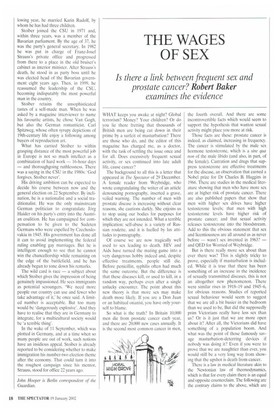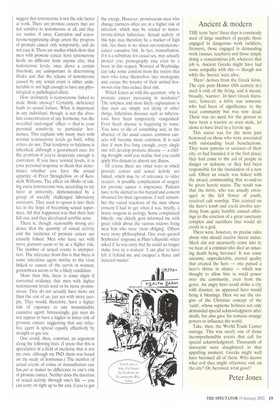THE WAGES OF SEX
Is there a link between frequent sex and
prostate cancer? Robert Baker
examines the evidence
WHAT keeps you awake at night? Global terrorism? Money? Your children? Or do you lie there fretting that thousands of British men are being cut down in their prime by a surfeit of masturbation? There are those who do, and the editor of this magazine has charged me, as a doctor, with the task of settling the issue once and for all. Does excessively frequent sexual activity, or sex continued into late adult life, cause cancer?
The background to all this is a letter that appeared in The Spectator of 29 December. A female reader from Weybridge, who wrote congratulating the writer of an article denouncing pornography, inserted a grave, veiled warning. The number of men with prostate disease is increasing without clear reasons, she cautions darkly. She enjoins us to stop using our bodies for purposes for which they are not intended. What a terrible implication: self-abuse is a variety of Russian roulette, and it is fuelled by lax attitudes to pornography.
Of course we are now tragically well used to sex leading to death. HIV and Aids have turned the mating game into a very dangerous hobby indeed and, despite effective treatments, people still die. Before penicillin, syphilis often had much the same outcome. But the difference is that these diseases kill, or used to kill, in a random way, perhaps even after a single unlucky encounter. The point about this new theory is that more sex may make death more likely. If you are a Don Juan or an habitual onanist, you have only yourself to blame.
So what is the truth? In Britain 10,000 men die from prostate cancer each year, and there are 20,000 new cases annually. It is the second most common cancer in men, the fourth overall. And there are some incontrovertible facts which would seem to support the hypothesis that wanton sexual activity might place you more at risk.
Those facts are these: prostate cancer is indeed, as claimed, increasing in frequency. The cancer is stimulated by the male sex hormone testosterone, which is a sine qua non of the male libido (and also, in part, of the female). Castration and drugs that suppress testosterone are effective treatments for the disease, an observation that earned a Nobel prize for Dr Charles B. Huggins in 1966. There are studies in the medical literature showing that men who have more sex are at higher risk of prostate cancer. There are also published papers that show that men with higher sex drives have higher testosterone levels; that men with high testosterone levels have higher risk of prostate cancer; and that sexual activity releases testosterone into the bloodstream. Add to this the obvious statement that sex and licentiousness are all around us as never before — wasn't sex invented in 1963? — and QED for Worried of Weybridge.
But is there really more sex about than ever there was? This is slightly tricky to prove, especially if masturbation is included. While it is true that there has been something of an increase in the incidence of sexually transmitted diseases, this is not an altogether new phenomenon. There were similar rises in 1918-19 and 1945-6, for obvious reasons. Studies of reported sexual behaviour would seem to suggest that we are all a bit busier in the bedroom than we used to be, But did the supposedly prim Victorians really have less sex than us? Or is it just that we are more open about it? After all, the Victorians did have something of a population boom. And what was the point of those famously savage masturbation-deterring devices if nobody was doing it? Even if you were to prove that we are naughtier than ever, you would still be a very long way from showing that the upshot is death from cancer.
There is a law in medical literature akin to the Newtonian law of thermodynamics, which is that for every claim there is an equal and opposite counterclaim. The following are the contrary claims to the above, which are suggest that testosterone is not the sole factor at work. There are prostate cancers that are not sensitive to testosterone at all, and they are nastier, if rarer. Castration and testosterone-suppressing drugs arrest the progress of prostate cancer only temporarily, and do not cure it. There are studies which show that men with prostate cancer have testosterone levels no different from anyone else; that testosterone levels, once above a certain threshold, are unimportant in determining libido; and that the release of testosterone caused by any sexual event is either undetectable or not high enough to have any physiological or pathological effect.
How intimately is testosterone linked to male libido anyway? Certainly, deficiency leads to sexual failure. What is important in any individual, though, is not the absolute concentration of any hormone, but the so-called 'end-organ' effect — that is, your personal sensitivity to particular hormones. This explains why many men with normal testosterone levels go bald, while others do not. That tendency to baldness is inherited, although a guaranteed cure for the problem if you're desperate enough is castration. If you have normal levels, it is your personal response to them that determines whether you have the sexual appetite of Peter Stringfellow or of Kenneth Williams, The effect on libido of taking extra testosterone was, according to my tutor at university, demonstrated by a group of socially challenged laboratory assistants. They used to spoon it into their tea in the hope of becoming sexual supermen. All that happened was that their hair fell out, and they developed terrible acne.
There is, though, reasonably strong evidence that the quantity of sexual activity and the incidence of prostate cancer are causally linked. Men who have sex with more partners seem to be at a higher risk. The number of sexual events is unimportant. The inference from this is that there is some infectious agent similar to the virus linked to cancer of the cervix in women; gonorrhoea seems to be a likely candidate.
More than this, there is some slight if contested evidence that men with higher testosterone levels tend to be more promiscuous. They do not actually have more sex than the rest of us, just sex with more people. They would, therefore, have a higher risk of exposure to any transmissible causative agent. Interestingly, gay men do not appear to have a higher or lower risk of prostate cancer, suggesting that any infective agent is spread equally effectively by straight or gay sex.
One could, then, construct an argument along the following lines. (I stress that this is speculation in a field of medicine that is not my own, although my PhD thesis was based on the study of hormones.) The number of actual events of coitus or masturbation one has per se makes no difference to one's risk of prostate cancer. Neither does the duration of sexual activity through one's life — you can carry on right up to the end, if you've got
the energy. However, promiscuous men who change partners often are at a higher risk of infection, which may be related to testosterone-driven behaviour. Sexual activity of this type may therefore be a marker of high risk, but there is no direct sex-testosteronecancer causative link. In fact, masturbation, if it is a substitute for casual sex, may actually protect you; pornography may even be a boon in this respect. Worried of Weybridge can take some comfort from the notion that men who force themselves into monogamy and escape the tyranny of their animal hormones may thus reduce their risk.
Which leaves us with the question: why is prostate cancer increasing in incidence? The simplest and most likely explanation is that men are simply not dying of other things. Infectious diseases such as tuberculosis have been temporarily vanquished. Even heart disease is beginning to wane. You have to die of something and, in the absence of the usual causes, common cancers will become more common. It is said that if men live long enough, every single one will develop prostate disease — a chilling thought, until you realise that you could apply this dictum to almost any illness.
Of course there are other ways in which prostate cancer and sexual activity are linked, which may be of relevance to older readers. A possible complication of surgery for prostate cancer is impotence. Patients have to be alerted to this hazard and consent obtained for their operations. I well remember the varied reactions of the men whose consent I had to get when I was, briefly, a house surgeon in urology. Some complained bitterly: one elderly gent informed me with great relish about the various widows living near him who were 'most obliging'. Others were more philosophical. One even quoted Sophocles' response in Plato's Republic when asked if he was sorry that he could no longer make love to a woman: 'I am glad to have left it behind me and escaped a fierce and frenzied master.'































































 Previous page
Previous page